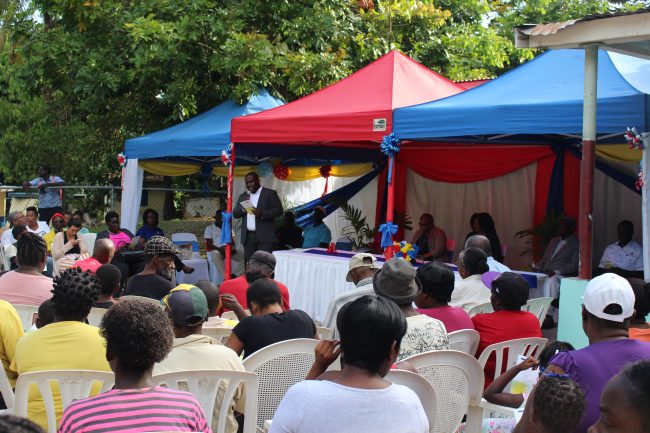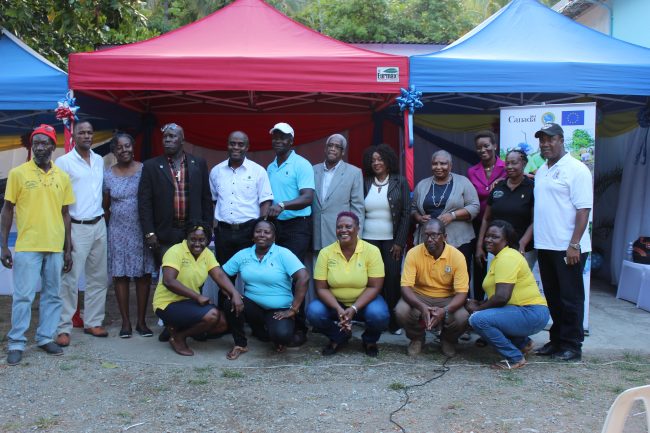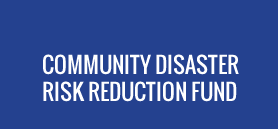Residents of Jamaica’s Llandewey and Ramble communities frequently have their lives disrupted by natural hazards. Over the last 18 years, severe floods, landslides and bush fires have dislocated residents and caused an estimated USD89.4 million in damages. From 2004 to 2005 alone, Hurricanes Ivan, Emily and Dennis devastated homes, roads and infrastructure to the tune of USD1.5 million.
“The Caribbean Development Bank recognizes climate change as one of the most significant developmental challenges currently facing the region,” said Ms. Cheryl Dixon, Coordinator of the Caribbean Development Bank’s Environmental Sustainability Unit.
“The devastation and suffering experienced in the aftermath of Hurricanes Irma and Maria in 2017 will not easily be forgotten, and climate change projections indicate that the frequency and severity of hurricanes, floods and droughts will only increase.”
This year, as the 2018 Atlantic Hurricane Season progresses, the Llandewey and Ramble communities are taking steps to be more prepared.
The recently launched Llandewey/Ramble Environment and Disaster Mitigation Initiative seeks to improve communities’ resilience to hazard impacts by taking a comprehensive approach to addressing needs. The project focuses on the following:
- Infrastructure improvements – This includes rehabilitation of the Rural Agricultural Development Authority’s (RADA) Llandewey Office, a key facility that houses workshops and community activities; two community centres which also serve as emergency shelters; and drainage and water harvesting systems;
- Business and livelihoods improvement – This involves conducting workshops in agriculture and food processing to help the Llandewey Women’s Group diversify their income-generating opportunities; as well as trainings in enhanced building construction techniques, which will target artisans and residents in the communities;
- Capacity-building in disaster risk reduction and climate change adaptation – This includes facilitating workshops in water harvesting and other drought mitigation techniques; and delivering trainings to Community Emergency Response Teams and Disaster Risk Management Committees in Llandewey and Ramble.
The project will be implemented by the Llandewey/Ramble Community Development Committee Benevolent Society (LRCDCBS) and is financed through CDB’s Community Disaster Risk Reduction Fund (CDRRF), which is a multi-donor trust fund supported by the Government of Canada and the European Union.
“We promise not just to implement a project, but to deliver value,” emphasised Mr. Paul Griffith, Project Manager of the Llandewey / Ramble Environment and Disaster Mitigation Initiative, addressing over 150 community residents gathered at the official launch on May 4, 2018.

Residents attend the launch of the Llandewey/Ramble Environment and Disaster Mitigation Initiative held on May 4, 2018 on the grounds of the RADA Llandewey Office, St. Thomas, Jamaica.
Expounding on the topic of project achievements, Dr. Dwayne Vernon, Executive Director of Jamaica’s Social Development Commission explained, “Project success is not completion of a building, but showing that, as a result of all these activities, the quality of life is much better and has improved significantly.”
An integral component to ensuring the success and sustainability of the project is community engagement. From the preparation phase, residents of Llandewey and Ramble have provided inputs to the design and scope of interventions and, through consultations, surveys and focus group discussions, have recommended ways to maintain community participation and commitment. This engagement was also shown through the numbers who attended the launch of the Initiative to meet the project management team and learn more about its components.
In addition to increasing resilience to disaster impacts, one of CDRRF’s objectives is to improve the community engagement skills and techniques of project beneficiaries, such as LRCDCBS, in order to enhance the quality of their dialogue with stakeholders in the project communities and to further guarantee ownership and sustainability of the interventions.
“I am certain, from the passion and commitment that this community has shown, and from the turnout here today, that this project will contribute to Jamaica’s Vision 2030 statement and will indeed make Jamaica the place of choice to live, work, raise families and do business, one community at a time,” stated Ms. Dian Black, Principal Director of the Debt Management Branch in the Ministry of Finance and the Public Service and Director Caribbean Development Bank.
The Llandewey/Ramble Environment and Disaster Mitigation Initiative received funding in the amount of USD650,000 and it is expected to benefit over 1,200 persons in the Llandewey and Ramble communities.

Special Guests, members of LRCDCBS and members of the “Llandewey/Ramble Environment and Disaster Mitigation Initiative” Project Management Team and Project Steering Committee at the launch held on May 5, 2018. L-R (back): Leland Shepherd, Assistant Public Relations Officer, LRCDCBS; Sheldon Scott, Deputy Parish Manager, RADA St. Thomas Office; Claudia James, Project Manager, CDRRF; Councilor Edwin Marr, St. Thomas Municipal Corporation – Llandewey Division; Dr. Dwayne Vernon, Executive Director, Social Development Commission; Horace Oglivie, Public Relations Officer, LRCDCBS; Paul Griffith, Project Manager; Dian Black, Principal Director of the Debt Management Branch in the Ministry of Finance and the Public Service and Director, CDB; Cheryl Dixon, Coordinator, Environmental Sustainability Unit, CDB; Nadine Brown, Manager, Sustainable Development and Regional Planning Division, Planning Institute of Jamaica; Pamela Bryce-Boxx, President, LRCDCBS; Peter Thompson, Chief Executive Officer, RADA. L-R (front): N’Keisha Crosdale Edwards, Secretary, LRCDCBS; Valrie Williams, Assistant Treasurer, LRCDCBS; Jacqueline Howell-Reid, Vice-President, LRCDCBS; Lennox Bartlett, Land Husbandry Officer, RADA; Daniesha Whitton, Assistant Secretary, LRCDCBS.




